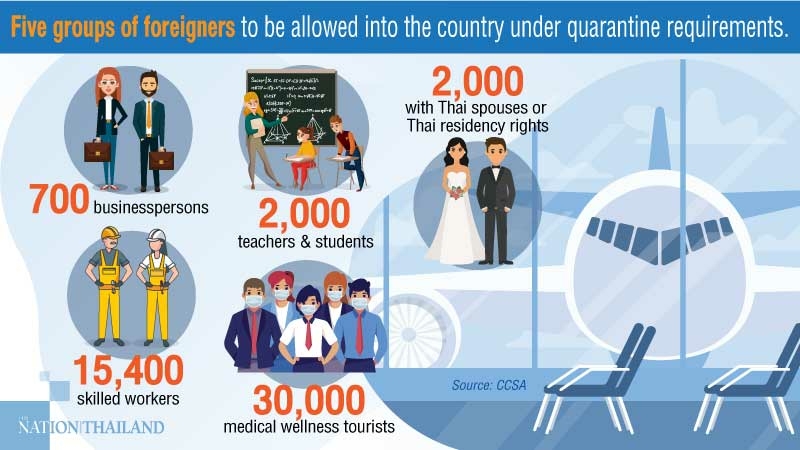- Joined
- Jul 15, 2008
- Messages
- 21,133
- Points
- 113
Pubs, bars may open on July 1 if they follow 22 iron-clad rules
National
Jun 22. 2020
By The Nation
A meeting between the Centre for Covid-19 Situation Administration (CCSA)’s special taskforce committee and entertainment venue operators resolved that pubs, bars and entertainment venues could be allowed to open from July 1 provided they strictly observe following 22 practices:
• Controlling the number of patrons to ensure the venue does not get congested;
• Checking every customer and staff member’s temperature;
• Providing alcohol-based hand sanitising gel at all entrances and other areas as necessary;
• Ensuring groups are no bigger than five;
• Ensuring customers queuing to be seated maintain social distancing;
• Ensuring all tables are at least 2 metres apart or are partitioned;
• Ensuring seats are at least one metre apart;
• Ensuring all venues are properly ventilated;
• Only eating and drinking is allowed;
• Beverages can only be served individually, and shared jugs or ice buckets are prohibited;
• Serving staff are required to wear a mask or face shield at all times;
• Stage or performance area must be partitioned, and audience must be at least 2 metres away from the stage;
• Event comperes or speakers are required to wear a face shield at all times;
• Patrons are not allowed to be loud or walk around the venue if not necessary;
• If the sharing of food or beverages cannot be avoided, everyone at the table must be provided with an individual serving spoon or glass;
• Toilets must be cleaned every 30 to 60 minutes;
• All tables, chairs and frequently touched surfaces must be cleaned regularly;
• No sports matches or competitions that will attract large groups of people are allowed;
• No video gaming or pub games like pool and darts will be allowed;
• Social distancing measures must be observed in smoking areas;
• No service personnel or public relations representatives are allowed to sit with customers.
National
Jun 22. 2020
By The Nation
A meeting between the Centre for Covid-19 Situation Administration (CCSA)’s special taskforce committee and entertainment venue operators resolved that pubs, bars and entertainment venues could be allowed to open from July 1 provided they strictly observe following 22 practices:
• Controlling the number of patrons to ensure the venue does not get congested;
• Checking every customer and staff member’s temperature;
• Providing alcohol-based hand sanitising gel at all entrances and other areas as necessary;
• Ensuring groups are no bigger than five;
• Ensuring customers queuing to be seated maintain social distancing;
• Ensuring all tables are at least 2 metres apart or are partitioned;
• Ensuring seats are at least one metre apart;
• Ensuring all venues are properly ventilated;
• Only eating and drinking is allowed;
• Beverages can only be served individually, and shared jugs or ice buckets are prohibited;
• Serving staff are required to wear a mask or face shield at all times;
• Stage or performance area must be partitioned, and audience must be at least 2 metres away from the stage;
• Event comperes or speakers are required to wear a face shield at all times;
• Patrons are not allowed to be loud or walk around the venue if not necessary;
• If the sharing of food or beverages cannot be avoided, everyone at the table must be provided with an individual serving spoon or glass;
• Toilets must be cleaned every 30 to 60 minutes;
• All tables, chairs and frequently touched surfaces must be cleaned regularly;
• No sports matches or competitions that will attract large groups of people are allowed;
• No video gaming or pub games like pool and darts will be allowed;
• Social distancing measures must be observed in smoking areas;
• No service personnel or public relations representatives are allowed to sit with customers.













